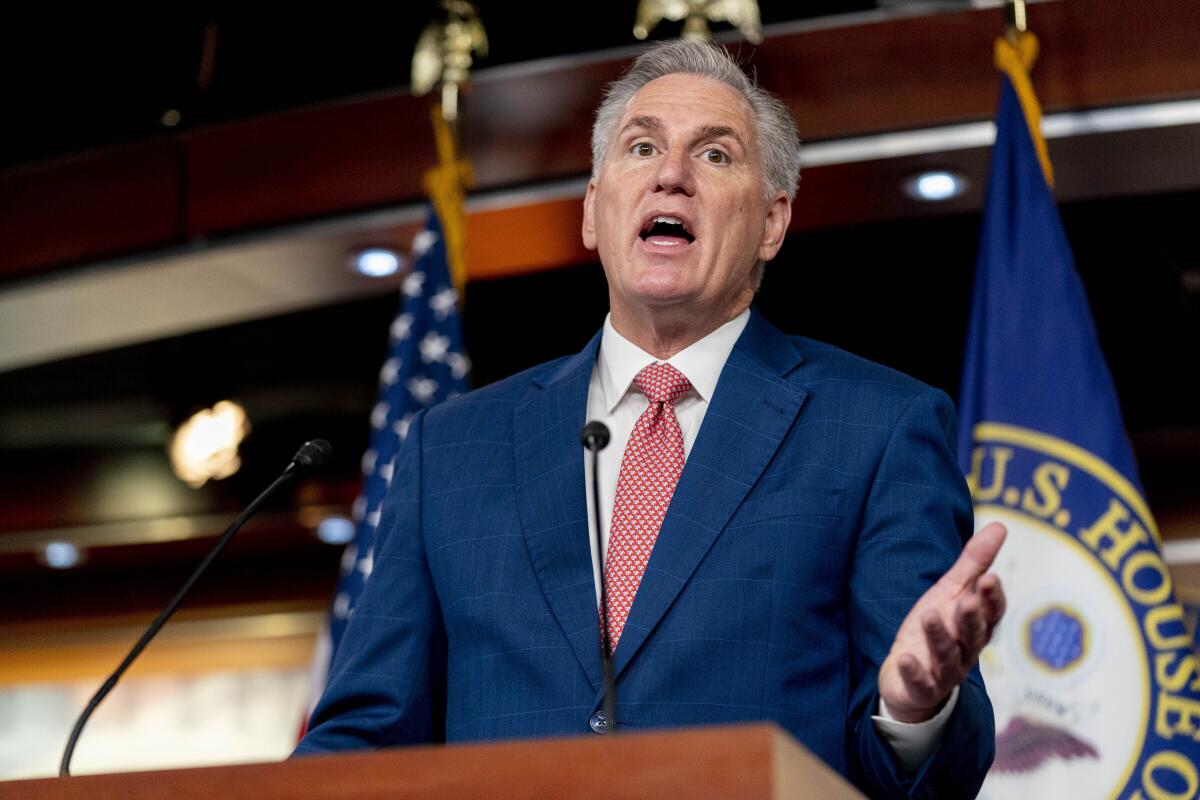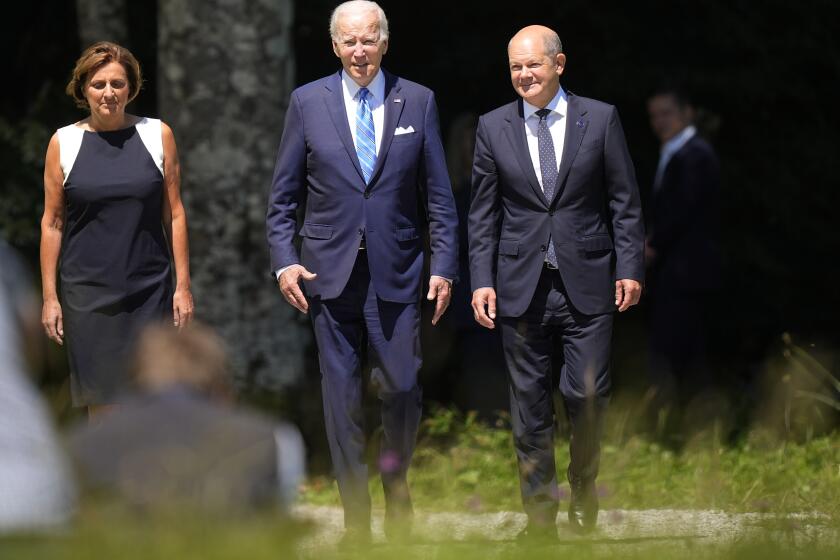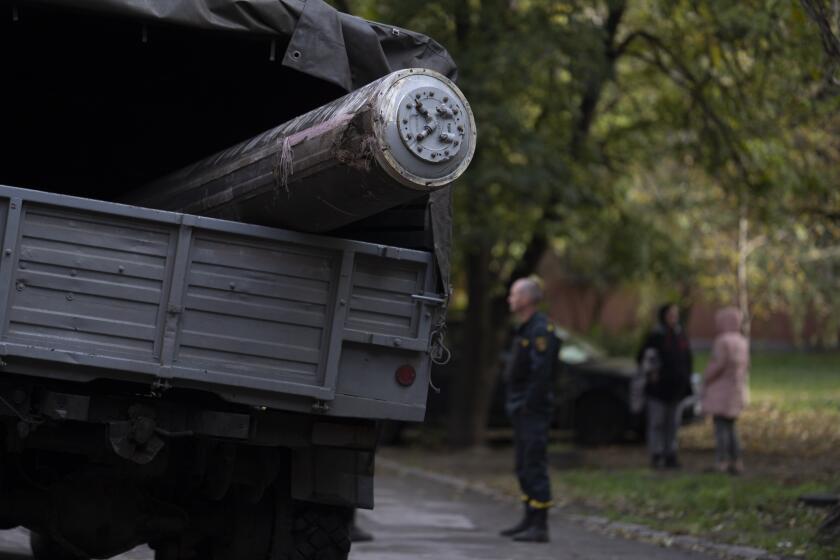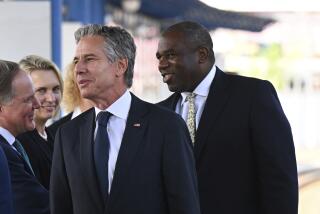Republicans who question U.S. aid to Ukraine may soon have the power to end it

WASHINGTON â For months, Western diplomats and foreign policy experts have worried that Europeâs support for Ukraine might falter as winter arrives and fuel shortages leave people freezing in their homes. But as Republicansâ polling numbers improve ahead of next monthâs midterm elections, even the United Statesâ continued assistance for the embattled Ukrainians is suddenly in doubt.
With less than three weeks until election day, Republicans have retaken a national lead on the generic ballot. And last week, the House Republican leader, Rep. Kevin McCarthy of Bakersfield, suggested that he may block further defense and humanitarian aid to Ukraine if he is installed as speaker of the House next year.
âI think people are gonna be sitting in a recession, and theyâre not going to write a blank check to Ukraine,â McCarthy told Punchbowl News on Tuesday, while adding that âUkraine is important.â
McCarthyâs comments indicate that skepticism about U.S. support for Ukraine is spreading from the GOPâs nationalist fringe to the partyâs mainstream.
Just a few months ago, Republican leaders in Congress were pushing President Biden to go bigger on a Ukraine aid package. But a shift among Republican voters has proved hard for the partyâs elected officials to ignore.
In February, only 9% of Republican voters believed the United States was providing too much support to Ukraine, according to a Pew Research Center poll. That figure rose to 32% in Pewâs September survey.
California Republicans hope inflation gives them an edge with independents in tight congressional races as Democrats fight to keep control of the House.
Some Republican lawmakers have refused to state for the record whether they would support continued aid to Ukraine. Others, such as Sen. Josh Hawley (R-Mo.), have voted against aid packages, saying they fear depleting U.S. arsenals by supplying Ukraine with weapons. The Pentagon says that concern is unwarranted.
McCarthy met with some resistance within his party. Former Vice President Mike Pence said there was no room for âapologistsâ for Russian President Vladimir Putin within the U.S. conservative movement.
âI know there is a rising chorus in our party, including some new voices to our movement, who would have us disengage with the wider world and abandon the traditional values at the heart of our movement,â Pence said Wednesday in a speech to the conservative Heritage Foundation. âBut appeasement has never worked, ever, in history. And now more than ever we need a conservative movement committed to Americaâs role as leader of the free world and as a vanguard of American values.â
Penceâs rebuttal to McCarthy and his explicit support for continued aid amounted to an endorsement of Bidenâs strategy on the war in Ukraine.
âWe must continue to provide Ukraine with the resources to defend themselves,â Pence said. âWe must continue to bring economic pressure of the most powerful economy in the world on Russia, and we must continue to provide the generosity, compassion and prayers of the American people until Russia relents and until peace is restored.â
Republican Rep. Adam Kinzinger of Illinois, who has already earned enmity from within the GOP because of his willingness to criticize former President Trump, was even more direct in chastising McCarthy.
âYouâre giving aid and comfort to the enemy intentionally or unintentionally,â said Kinzinger, who is retiring after this term. âThere are a lot of people, frankly, in the world that are worrying about what a Republican majority could do.â
Most Americans agree with Penceâs view and that of most Democrats on this issue. In fact, the war in Ukraine has fostered as much bipartisan consensus in Washington as any matter that Biden and this Congress have taken up.
According to a new survey by the Chicago Council on Global Affairs released Thursday, 81% of Americans believe the U.S. should maintain or increase its level of support for NATO, the highest level of support for the alliance that the council has found since it started polling on that question in 1974.
âThere is a remarkable degree of consensus on those fundamental issues about the transatlantic alliance,â said Ivo Daalder, a former U.S. ambassador to NATO who is now president of the Chicago Council.
âAll these issues that were debated during the Trump years, thereâs now consensus about these longstanding positions that have been fundamental to U.S. foreign policy.â
McCarthyâs comments, however, were âdisconcertingâ to Daalder. He noted that new far-right leaders elected in Italy and Sweden, at the parliamentarian level, have remained steadfast in their support for Ukraine despite the far more acute consequences sending European economies into a tailspin.
âIf the leadership in the Republican Party decides to make a political issue out of Ukraine, then like so many other things, divisions will happen,â Daalder said. âThe Ukrainians are so dependent on support from the U.S., they always have to worry about changes here. The reassuring part is that, up to this point, large bipartisan majorities have stood shoulder to shoulder with Ukraine.â
Biden arrives in Europe for G-7 and NATO summits as the worldâs leading democracies grapple with war in Ukraine as well as their own domestic issues.
Republican reluctance to continue U.S. financial and military aid to Ukraine has been bubbling up across the country over the last several months, especially in congressional and local election campaigns.
For the most part, opponents of aid for Ukraine cite, as McCarthy did, the large outlays of money at a time American citizens are themselves suffering financially from high inflation on consumer goods and a volatile stock market. The Biden administration has committed more than $40 billion to Kyiv.
Some Republicans have also revived what analysts call âneo-isolationism,â the sentiment promoted by some conservatives that advocates for the U.S. to focus inward and to stay out of conflicts overseas.
But most dangerous, said Heather Conley, president of the German Marshall Fund in the U.S., are the arguments made by some Republicans and others that âproactively and willfullyâ parrot Russian disinformation to discredit Ukraine and undercut any effort to save it from Moscow.
These include tropes about a supposedly unconquerable culture of corruption within the Ukraine government, which Putin has tried improbably to portray as filled with Nazis, or the championing of Putin as an uber-powerful, nuclear-armed strongman who should never be crossed. A conservative Republican political action group called for an end to âgift-givingâ to Kyiv, echoing the Kremlin.
Raising fears and doubts plays right into Putinâs hands, foreign policy experts and European diplomats say, noting the Russian leader is counting on Western unity and resolve to fade over time, allowing him to get away with the invasion and destruction of a neighboring independent country.
Conley and others said the administration and supporters of Ukraine need to do a better job of explaining exactly what is at stake in the conflict. Beyond high prices at the gas pump, the submission of Ukraine to an unfettered Russia will lead to a world order in which Moscow and Beijing control much of the globe at the expense of U.S. interests and international stability, Conley said.
âWhat we are spending now will pale by comparison to that kind of global conflict,â she said. The Russia-China game plan goes this way, she says: âThe U.S. and West are in irreversible decline, weâve been held back by the West, and now it is time to shape the international system to our preference.â
In that scheme, she said, âRussia disrupts, China dominates.â
Biden alluded to the greater stakes late Thursday upon return from a speech-making trip to Pennsylvania.
âThese guys donât get it,â Biden told reporters, referencing the Republicans criticizing the aid packages. âItâs a lot bigger than Ukraine. Itâs Eastern Europe. Itâs NATO. Itâs really serious, serious consequential outcomes. ... [The critics] donât get it that how America does is going to determine how the rest of the world does.â
Russian-installed officials were reported desperately trying to turn the city of Kherson into a fortress.
As it happened, McCarthyâs comments to Punchbowl came on the same day the defense ministers of Britain and Estonia, NATO allies who are essential in the battle to support Ukraine, were in Washington in meetings with their U.S. counterpart, Secretary of Defense Lloyd J. Austin III.
Estoniaâs Hanno Pevkur, speaking at the Pentagon, sought to downplay what by all accounts is growing anxiety among U.S. partners over how reliable Washingtonâs support will remain after the midterm elections. And at the same time he emphasized the many contributions Europeans have made to the war effort.
âI would like to thank the U.S. for its leadership in supporting Ukraine to fight for the country and for the freedom,â Pevkur said. âAnd of course, we will stand united with all of our allies today to make sure that the â in the future, we will not look back and think that we could have done more.â
More to Read
Get the L.A. Times Politics newsletter
Deeply reported insights into legislation, politics and policy from Sacramento, Washington and beyond. In your inbox three times per week.
You may occasionally receive promotional content from the Los Angeles Times.















